Prophet Yusuf's New Life (as)
Prophet Yusuf's Escape From The Well
The following verse informs us how Prophet Yusuf (as) escaped from the well:
Some travellers came that way and then dispatched their water-drawer who let his bucket down. He said, "Good news for me, I've found a boy!" They then hid him away among their goods. Allah knew very well what they were doing. (Surah Yusuf: 19)
 | 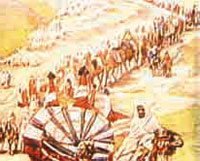 |  |
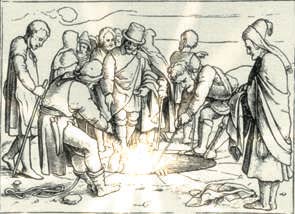 | The bottom two pictures show the traveling caravans en route to Egypt. The map shows the route taken by the caravans of the time, and the drawing on the left depicts the caravan's watergatherers pulling Prophet Yusuf (as) out of the well. | |
The moment Prophet Yusuf (as) was thrown into the well, and the moment he was rescued from it, were both incidents set out in his destiny. Nothing happens outside one's predetermined destiny. For that reason the caravan that would come past after Yusuf (as) had been thrown into the well, its destination and the kind of people in it had all been set out by the predetermination of Allah before the prophet (as) was even born. Believers who grasp this important truth are always submissive to the will of Allah because of it.
As can be seen from this verse, the group that found Prophet Yusuf (as) in the well and rescued him thought that they would be able to sell him, and regarded him as a piece of merchandise. That was because the system of slavery was then still prevalent in Egypt and the surrounding area. People actively engaged in the trade, buying and selling children in particular. That was why the people who found him had such cause to celebrate at the prospect of making commercial gain out of him. However, the continuation of the verse reveals that they underestimated his value and sold him on cheaply:
 | 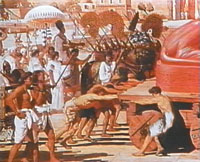 | 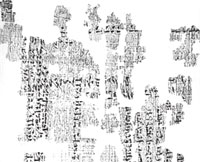 |
Top left; an image of Prophet Yusuf (as) being sold into slavery for a cheap price. Top right; A representation of the slavery current in Egypt at the time. Right; A document of the time giving information about slavery in Egypt. | ||
They sold him for a pittance, a few small coins, considering him to be of little worth. (Surah Yusuf: 20) | ||
Bottom; The surviving remains of an Egyptian slave market. Side; The slave market from a film about the life of Prophet Yusuf (as). | ||
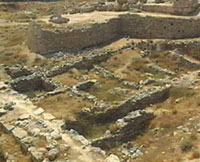 | 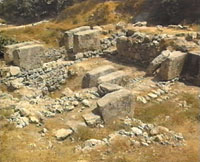 |  |
There is actually great wisdom in this state of affairs. If they had placed a high value on him, if they had realised that he was a chosen figure, a prophet, they would have wanted to harm him. Similarly, other unbelievers who came to hear of it would also wish to do him wrong. The fact that they underestimated him and sold him into slavery in expectation of a material profit actually worked out in his favour.
The wisdom behind this episode in the life of Prophet Yusuf (as) lies in the way it indicates the great benefit and protection for the believers that is hidden in the general tendency of unbelievers to underestimate them, regarding them as insignificant and inconsequential.
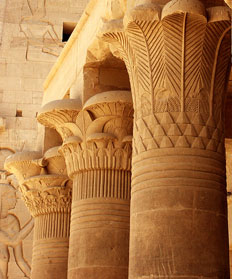 | 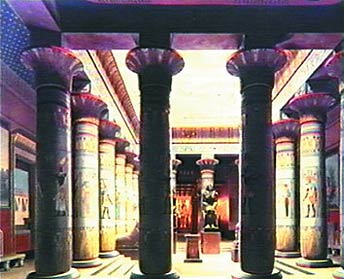 |
Examples of the splendid buildings in Egypt from the time of Prophet Yusuf (as). | |
There is another noteworthy point here. As we know, Prophet Yusuf (as) was known for his extraordinary beauty. Yet as we have seen, this beauty had not yet become apparent at the time he fell into the slave traders' hands. They failed to see what a valuable individual he was, describing him merely as a "child." That means that Allah in His wisdom had concealed his beauty at that time, which was yet another manifestation of His help and protection.
According to the Qur'an, Prophet Yusuf (as) was found by the slave traders and sold to an Egyptian. This is related as follows:
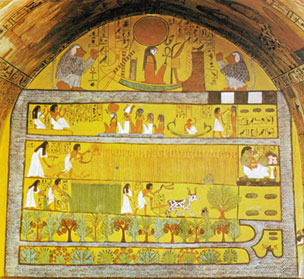 |
A mural depicting scenes from the daily life of the time. |
The Egyptian who had bought him told his wife, "Look after him with honour and respect. It's possible he will be of use to us or perhaps we might adopt him as a son." And thus We established Yusuf in the land to teach him the true meaning of events. Allah is in control of His affair. However, most of mankind do not know. (Surah Yusuf: 21)
By means of this Egyptian who bought him, Allah ensured that Prophet Yusuf (as) was protected, well cared for and allowed to grow up settled in Egypt. His purchaser entrusted him to his wife in a very kind and compassionate manner, advising her to take good care of him. Actually, they thought that Yusuf (as) could be very useful to them and even thought of adopting him. This is still further evidence of Allah's help, support and love and compassion for the prophet (as). Allah rescued him from the perils of the well, settled him in a favourable place and made Egypt his home. All of these things were blessings from Allah.
Furthermore, Allah gave Prophet Yusuf (as) knowledge, teaching him to interpret people's words. There is no doubt that this is a great ability, and at the same time a blessing, which Allah confers on such of His servants as He chooses. The verse concerned states:
He gives wisdom to whoever He wills and he who has been given wisdom has been given great good…(Surat al-Baqara: 269)
He Is Slandered When He Reaches Maturity
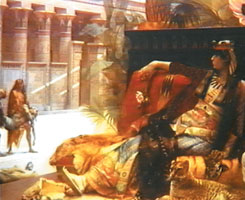 |
A depiction of the wife of the Egyptian official who attempted to "solicit" Prophet Yusuf (as), in the words of the Qur'an. |
Thus it was that Prophet Yusuf (as) began to live with the Egyptian, Aziz. As well as teaching him to interpret people's words, Allah also gave him judgement and knowledge when he reached maturity. The judgement referred to in the relevant verse is the ability to reach a just decision compatible with the strictures of Allah. Knowledge, on the other hand, may be the knowledge of learning or else perhaps the ability to perceive the inner aspects of things (Allah knows best, of course). These are all indications that Allah had singled him out for his upright behaviour and blessed him. This truth is described in the Qur'an as follows:
And then when he became a full-grown man, We gave him knowledge and right judgement too. That is how We reward all doers of good. (Surah Yusuf: 22)
However, when Prophet Yusuf (as) reached maturity, the lady of the house he lived in, Aziz's wife, wanted to seduce him. A suitable environment was prepared to that end, all the doors were tightly locked and an improper suggestion made to the prophet (as). His response in these circumstances is a model of virtuous conduct for all believers to aspire to.
First and foremost, although the woman desired him, he sought refuge in Allah rather than commit such an ugly sin, which would have been a violation of Allah's sanctions. He then behaved in a loyal and civilised manner, reminding the woman of Aziz and saying that he had looked after him and treated him well. In this way, he made it absolutely clear that he could commit no such act of disloyalty to Aziz. Immediately after that he stated that the wrongdoers could not hope for salvation and that this would be cruel behaviour. The Qur'an relates the episode as follows:
The woman whose house it was wanted to seduce him. She barred the doors and said, "Come over here!" He said, "Allah is my refuge! He is my Lord and has been good to me with where I live. Those who do wrong will surely not succeed." She wanted him and he would have wanted her, had he not seen the clear proof of his Lord. That happened so We might avert from him all evil and lust. He was Our chosen servant. (Surah Yusuf: 23-24)
As is clear from the above verses, Prophet Yusuf (as) knew that adultery was a sin in the sight of Allah. He therefore avoided transgressing and tried to escape from the woman. The way that Allah indicates that he would have wanted her, contains a very important secret regarding this particular test. It is possible for a believer's lower self to turn in the direction of something that is sinful according to his religion. The important thing is for the believer to refuse to submit to that desire and to demonstrate the determination not to go beyond the limits Allah set. There would have been no test if he had had no physical desires. The subsequent events are related in the following verses:
They raced to the door. She tore his shirt at the back. They met her husband by the door. She said, "How should a man whose intention was to harm your family be punished for what he did except with prison or painful punishment?" (Surah Yusuf: 25)
 |
A depiction of the virtuous behaviour of Prophet Yusuf (as) in the face of the woman's improper suggestion. She is tearing the back of Prophet Yusuf's shirt (as). |
Following this incident, the woman began slandering Prophet Yusuf (as), despite his virtuous behaviour and avoidance of adultery. Even though he was completely innocent, she told her husband, the vizier, that Yusuf (as) had approached her with evil intentions, demanding that he either be thrown into prison or else suffer torture. This is a clear indication that the woman had no fear of Allah and possessed a cruel streak. The improper suggestion she made to Yusuf (as) was in any case the most important indication of her corrupt nature. The way that she made these false allegations and wanted him to be punished, despite his innocence, was simply an expression of that fundamental corruptness. Prophet Yusuf (as) responded in this way:
He said, "It was she who tried to seduce me." A witness from her people then declared, "If his shirt is torn in front, she speaks the truth and he has clearly told a shameless lie. If his shirt is torn at the back, then she has lied and he has clearly told the simple truth." (Surah Yusuf: 26-27)
In this situation, the fact that the woman had torn the back of Prophet Yusuf's shirt is evidence that he had fled in the direction of the door, with the woman chasing after him. According to the verses, the prophet's innocence had been proven:
He saw the shirt torn at the back and said, "The source of this is women's deviousness. Without a doubt your guile is very great. Yusuf, ignore all this, and you, my wife, should ask forgiveness for your evil act. There is no doubt that you are in the wrong." (Surah Yusuf: 28-29)
Aziz realised that Prophet Yusuf (as) was innocent and said that this was all a trick of his wife's. His words, as related in the above verses, are evidence that Aziz had more conscience than his wife. Yet the incident did not end there. The subsequent developments are related in the Qur'an:
Some city women said, "The governor"s wife solicited her slave. He's fired her heart with love. We see that she's the one to blame." (Surah Yusuf: 30)
As we see, the incident spread among the women of the city. The way that attention is drawn to the women in the verse may be intended to show how ignorant people’s lack of moral virtues goes hand in hand with either a gossiping or mischief-making nature. (Allah knows best, of course.)
The women in the city then began to speak against the vizier's wife, condemning her actions. They realised that the guilty party was not Prophet Yusuf (as) but Aziz's wife, who was made uneasy by the criticism of her. In fact, people who ignore the good pleasure of Allah and aim to please other people instead, are the most fearful of being belittled in the public eye and spoiling their image. One of the things these people, who have no fear of Allah are actually most afraid of, is that the things they do in secret are discovered by others. That was the position Aziz's wife found herself in.
When Aziz’s wife realised that she had become the target of gossiping women she prepared a trap for them. The aim here was to show that she was not entirely to be blamed for succumbing to her immoral urges with respect to Prophet Yusuf (as), because he was such an extraordinarily beautiful man. Indeed, the other women were amazed at Prophet Yusuf's beauty:
But when she heard of their malicious talk, she sent for them and made a sumptuous meal and then she gave a knife to each of them. She said [to Yusuf], "Go out to them." When they saw him, they were amazed by him and cut their hands. They said, "Allah preserve us! This is no man. What can this be but a noble angel here!" (Surah Yusuf: 31)
As the above verse shows, the beauty of Prophet Yusuf reminded the women of Allah, and had no choice but to call upon Him spontaneously in the face of such loveliness. They regarded his beauty as something superhuman and even claimed that he was an angel. If we recall, Allah had hidden Prophet Yusuf's striking beauty when he was a child, thus protecting him (as). As time passed, however, and Prophet Yusuf (as) reached maturity, that beauty began to attract considerable attention. There is very definitely great wisdom concealed within each one of these details. The continuation of the story reveals what took place next:
She said, "You see! It's him you blamed me for. I tried seducing him but he refused. If he does not do what I order him, he will be put in prison and brought low." (Surah Yusuf: 32)
As we can see, the woman openly confessed her guilt and admitted that Prophet Yusuf (as) had wanted to protect his chastity. Yet she also repeated that same ugly proposition in front of a large group of people, commanding Prophet Yusuf (as) to go along with her, and threatened him with prison and public humiliation if he refused to comply. It can be seen from this just how cruel and bereft of moral integrity this woman was. This is of course a most astonishing situation. Maybe it was the woman's confidence in her position in Egypt, in her wealth, and the fact that Prophet Yusuf (as) was her slave, that impelled her to commit this sin. This was a most depraved suggestion, and Aziz's wife had no compunction about repeating it in front of everyone present. This is proof both of her own lack of religious values and of the other women's looseness in religious matters. In the same way that no devout woman could ever embark on such a transgression, so no devout woman could ever stand by and watch while something of that sort happened. Moreover, the women described in the story remained silent in the face of the threats uttered by the vizier's wife and turned a blind eye to her ugly actions.
The Qur'an also relates how Aziz raised no objection to Prophet Yusuf (as) being thrown into the dungeon, even though he had seen all the evidence. In the same way his wife turned a blind eye to Yusuf's years of imprisonment (as). As can be seen from this example, non-believers always support people of a similar frame of mind, and are able to sit back and watch and remain silent while evil plans are hatched and set in motion. We see how the city women in the story preferred to remain silent, thus making them accomplices in the plot. They did not even support Prophet Yusuf (as) when Aziz's wife confessed, but sat back and watched as a virtuous man was thrown into gaol.
Another noteworthy element here is Prophet Yusuf's sincerity. He immediately sought refuge in Allah and sincerely opened his heart to Him and begged for help. Great sincerity and purity of heart are exemplified by his behaviour:
He said, "My Lord, the prison is preferable to me than what they call on me to do. Unless You turn their guile away from me, it may well be that I will fall for them and so become a man of ignorance." His Lord replied to him and turned away from him their female guile and deviousness. He is the One Who Hears, the One Who Knows. (Surah Yusuf: 33-34)
The most striking aspect of this part of the story is the women's resort to setting traps. One of the lessons to be drawn from this episode is that believers need to be on their guard against ignorant women in such matters. Since they are unmindful of what is lawful and unlawful and are unaware of the bounds Allah set for various reasons, they are liable to transgress in order to satisfy their pride; sometimes from submission to their physical desires and sometimes from an intention to place believers in a difficult position. Such women can sometimes lay snares for male believers, but we must make it clear, however, that we are not referring to all women here, only ignorant ones with no fear of Allah.
The Innocent Yusuf (as) Is Throw Into a Dungeon
As we have already seen, the wife of Aziz admitted in front of the women of the city that it was she who had had designs on Prophet Yusuf (as) and that he had rejected her. Aziz was of the same opinion, reminding his wife that she was a sinner who needed to beg Allah for forgiveness. In other words, everyone who witnessed or heard about these events knew that Prophet Yusuf (as) was innocent and a victim of the woman's scheming ways. Despite that however, they came to a decision devoid of all conscience and threw Prophet Yusuf (as) into a dungeon:
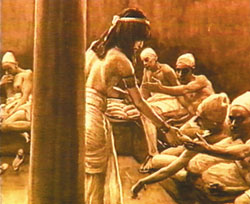 |
Prophet Yusuf (as) spent long years in a dungeon despite the fact that his innocence had been clearly proved. The above picture shows an Egyptian prison of the time. |
Then, after they had seen the Signs, they thought that they should still imprison him for a time. (Surah Yusuf: 35)
The most important point here is that they were able to throw a completely innocent person into prison. What emerges from this is that the system that prevailed in that society at that time was not one of justice, but one in which might was regarded as right. Moreover, the fact that they were able to imprison someone who was entirely guiltless and whom the evidence showed to be completely innocent, demonstrates that theirs was a legal system that they were able to manipulate at will in their own interests.
This is part of the immutable pattern of Allah ; unbelievers, especially those who reject His messengers, always seek to imprison and place obstacles in the way of believers. The same thing happened in the time of our Prophet, Muhammad (saas). Allah describes this truth in these terms:
When those who disbelieve were plotting against you to imprison you or kill you or expel you: they were plotting and Allah was plotting, but Allah is the Best of Plotters. (Surat al-Anfal: 30)
As can be seen, this situation that Muslims and the messengers of Allah have faced in every age was also inflicted on Prophet Yusuf (as). Had Prophet Yusuf (as) not been a Muslim, and had he bowed his head to their superstitious and morally degenerate system, then they would not have been so hostile towards him, and would even have turned a blind eye had he committed a crime. However, the main reason for their enmity towards him was the fact that he was an immaculate Muslim who valued above all else the good pleasure of Allah, and firm adherence to His commandments and prohibitions. As we are told in several Qur'anic verses, people far removed from the religion have always harboured a similar hostility towards believers.
In the same way that the throwing of the innocent Prophet Yusuf (as) into the dungeon shows what an unjust legal system prevailed in Egypt, it also indicates the moral degeneration that was present in society as a whole at the time.
"All Plotting Belonhs To Allah"
Superficially, the events we have so far described might be regarded as "disasters" experienced by Prophet Yusuf (as). A look at the heart of the matter, however, shows that it was Allah who brought all of this about and ordered events. As we stated earlier, these incidents were all part of Prophet Yusuf's predetermined destiny, and were all highly auspicious for him (as). Indeed, someone who undergoes such a test as being innocently imprisoned and yet remains patient and submissive to the will of Allah under such conditions, is someone who possesses true God concsiousness. It is clear that such a person will gain the love and good pleasure of Allah . From that point of view, Prophet Yusuf's imprisonment was very far from being an evil thing or a tragedy; it was, on the contrary, a most positive occurrence.
Furthermore, this story draws attention to the way that unbelievers or mischief-makers come together to set traps for believers. These people, however, as we have already made clear, can never actually harm true believers. There is a trap set within the all encompassing scheme of Allah which surrounds the traps they set for others. As they lay their snares, Allah hears and knows everything they say, their decisions and innermost feelings, down to the finest detail. In fact, the fact that they will set snares for believers was already enshrined in their destinies long before they were even born. Allah had also determined in their destinies those events that would bring their traps to nothing. For that reason, every trap set for believers comes into being as a failure. Allah reveals this secret in the Qur'an:
Those before them plotted but all plotting belongs to Allah. He knows what each self earns, and the disbeliever will soon know who has the Ultimate Abode. (Surat ar-Rad: 42)
They concocted their plots, but their plots were with Allah, even if they were such as to make the mountains vanish. Do not imagine that Allah will break His promise to His Messengers. Allah is Almighty, Exactor of Revenge. (Surah Ibrahim: 46-47)
Thus it is that believers are submissive to the will of Allah when they encounter such situations, and realise that the traps laid for them have already been neutralised. No matter how powerful the snare set for them they always respond calmly and moderately. This stems from their trust in Allah and their belief in His Books and His Messengers. Therefore, it is a secret peculiar to believers, since it is impossible for people who do not believe and who live their lives far removed from religion, to enjoy such inner calm.
